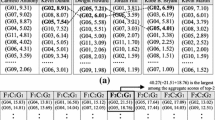Abstract
A top-N selection query against a relation is to find the N tuples that satisfy the query condition the best but not necessarily completely. In this paper, we propose a new method for evaluating top-N selection queries against relational databases. This method employs a learning-based strategy. Initially, it finds and saves the optimal search spaces for a small number of random top-N queries. The learned knowledge is then used to evaluate new queries. Extensive experiments are carried out to measure the performance of this strategy and the results indicate that it is highly competitive with existing techniques for both low-dimensional and high-dimensional data. Furthermore, the knowledge base can be updated based on new user queries to reflect new query patterns so that frequently submitted queries can be processed most efficiently.
This work is completed when the first author was a visitor at SUNY at Binghamton.
Access this chapter
Tax calculation will be finalised at checkout
Purchases are for personal use only
Preview
Unable to display preview. Download preview PDF.
Similar content being viewed by others
References
Bruno, N., Chaudhuri, S., Gravano, L.: Top-k Selection Queries over Relational Databases: Mapping Strategies and Performance Evaluation. ACM Transactions on Database Systems 27(2), 153–187 (2002)
Bruno, N., Chaudhuri, S., Gravano, L.: STHoles: A Multidimensional Workload-Aware Histogram. In: ACM SIGMOD Conference (2001)
Bruno, N., Gravano, L., Marian, A.: Evaluating Top-k Queries over Web-Accessible Databases. In: 18th IEEE International Conference on Data Engineering (2002)
Carey, M., Kossmann, D.: On saying “Enough Already!” in SQL. In: ACM SIGMOD Conference (1997)
Carey, M., Kossmann, D.: Reducing the braking distance of an SQL query engine. In: International Conference on Very Large Data Bases (1998)
Chaudhuri, S., Gravano, L.: Evaluating top-k selection queries. In: International Conference on Very Large Data Bases (1999)
Chen, C., Ling, Y.: A sampling-based estimator for top-k selection query. In: 18th International Conference on Data Engineering (2002)
Chen, C., Roussopoulos, N.: Adaptive selectivity estimation using query feedback. In: ACM SIGMOD Conference, pp. 161–172 (1994)
Chen, Y., Meng, W.: Top-N Query: Query Language, Distance Function and Processing Strategies. In: International Conference on Web-Age Information Management (2003)
Donjerkovic, D., Ramakrishnan, R.: Probabilistic optimization of top N queries. In: International Conference on Very Large Data Bases (1999)
Fagin, R.: Combining fuzzy information from multiple systems. In: ACM Symposium on Principles of Database Systems, pp. 216–226 (1996)
Fagin, R.: Fuzzy queries in multimedia database systems. In: ACM Symposium on Principles of Database Systems (1998)
Fagin, R., Lotem, A., Naor, M.: Optimal aggregation algorithms for middleware. In: ACM Symposium on Principles of Database Systems (2001)
Lee, J., Kim, D., Chung, C.: Multi-dimensional Selectivity Estimation Using Compressed Histogram Information. In: ACM SIGMOD Conference, pp. 205–214 (1999)
Yu, C., Philip, G., Meng, W.: Distributed Top-N Query Processing with Possibly Uncooperative Local Systems. In: VLDB, Berlin, Germany, September 2003, pp. 117–128 (2003)
Author information
Authors and Affiliations
Editor information
Editors and Affiliations
Rights and permissions
Copyright information
© 2004 Springer-Verlag Berlin Heidelberg
About this paper
Cite this paper
Zhu, L., Meng, W. (2004). Learning-Based Top-N Selection Query Evaluation over Relational Databases. In: Li, Q., Wang, G., Feng, L. (eds) Advances in Web-Age Information Management. WAIM 2004. Lecture Notes in Computer Science, vol 3129. Springer, Berlin, Heidelberg. https://doi.org/10.1007/978-3-540-27772-9_21
Download citation
DOI: https://doi.org/10.1007/978-3-540-27772-9_21
Publisher Name: Springer, Berlin, Heidelberg
Print ISBN: 978-3-540-22418-1
Online ISBN: 978-3-540-27772-9
eBook Packages: Springer Book Archive




